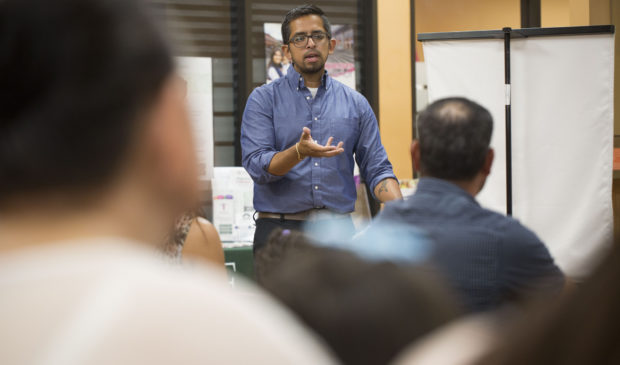How one immigrants’ rights group is preparing for ‘sanctuary cities’ law
Wednesday, August 23, 2017 by
Audrey McGlinchy, KUT Candelario Vazquez, 34, stood in front of a 20-person audience. None of the adults and children, some of them squirming in their hard plastic chairs, asked to be in his audience.
“Good morning, friends,” said Vazquez, who works for the immigrants’ rights nonprofit Workers Defense Project. He wears glasses and has specks of gray in his black hair. As Vazquez addressed the small crowd in Spanish, he did battle with an intercom, over which names were called out. “(Sometimes) I (have to) stop every five seconds,” he said.
Vazquez was at the Consulate General of Mexico in downtown Austin, where he goes to talk to whoever is waiting for a visa or a passport about their rights ahead of Senate Bill 4. The bill, signed into law by Gov. Greg Abbott in May, goes into effect on Sept. 1. Among other requirements, SB 4 prohibits law enforcement agencies from adopting a policy that limits officers’ ability to ask people’s immigration statuses after they’ve been detained or arrested.
Since SB 4 was signed into law, cities across the state have joined a lawsuit challenging it. And while people across Texas wait for a ruling, local immigrants’ rights groups, including the Catholic Charities of Central Texas and Here to Stay, are hosting “Know Your Rights” seminars. Some of them go for several hours. Since no one’s actually signed up for Vazquez’s talk, his lasts about 15 minutes.

“You have rights when it comes to police and immigration authorities,” Vazquez said. The first right is to remain silent if stopped. Vazquez unraveled a red poster.
“I choose to be silent,” he said slowly, in English.
On the poster he’s drawn an eyeball, shoes, the number two, a bumble bee and the word “silent.” “It’s like ‘eye,’ ‘choose’ like my shoes,” said Vazquez, lifting up his leg to point at his shoe. “‘Two,’ ‘be,’ like a bee, ‘silent.’” The crowd repeated it back to him, in English.
But if you can’t find the words, said Vazquez, hand the officer a wallet-sized piece of paper. It looks like a business card. One part of it reads: “I do not wish to speak with you, answer your questions, or sign or hand you any documents based on my 5th Amendment rights under the United States Constitution.”
“Present this card when you want to remain silent,” said Vazquez. As he handed them out, people took multiple copies. He encouraged them to hand them out to neighbors and family. A man who had been speaking with an attendant at one of the counters tapped Vazquez on the arm, asking for a card.
Soon, it was time for Vazquez to wrap up. Audience members can be called away at any moment. He asked for a volunteer. Rosa Álvarez raised her hand.
Vazquez then pulled a navy cap with the words “Special Police” across the front out of his bag, and put it on. He told Álvarez to imagine she was walking down Sixth Street, having just finished shopping, when she is stopped by a cop. Vazquez began speaking Spanish with an English accent, and he became suddenly rude and domineering: “What are you doing on this road?” (Later, Vazquez explained why he takes this demeanor: “I watched a lot of B-movies growing up,” he said. “It always had the really villainous cop in the middle of the desert patrolling communities of color.”)
Álvarez fumbled over the words she had just been taught. A man in the audience cued her.
“I choose to be silent,” he said. She repeated it to Vazquez. He asked to see her ID.
She looked nervous and afraid. The same man who cued her speaking told her to hand Vazquez the wallet-sized card. She did.
“Oh, you don’t want to talk to me?” Vazquez asked, before dismissing her. “Go on, then.”
Vazquez, though, will be back next week.
This story was produced as part of the Austin Monitor’s reporting partnership with KUT. Photo by Gabriel Cristóver Pérez/KUT News.
The Austin Monitor’s work is made possible by donations from the community. Though our reporting covers donors from time to time, we are careful to keep business and editorial efforts separate while maintaining transparency. A complete list of donors is available here, and our code of ethics is explained here.
You're a community leader
And we’re honored you look to us for serious, in-depth news. You know a strong community needs local and dedicated watchdog reporting. We’re here for you and that won’t change. Now will you take the powerful next step and support our nonprofit news organization?










